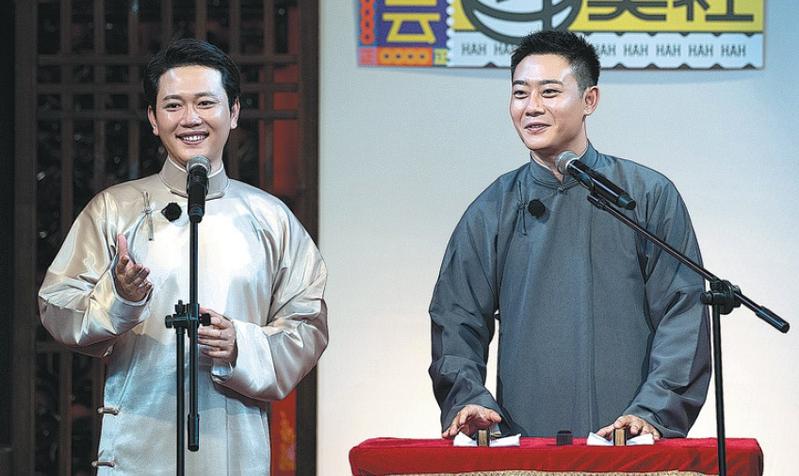 Young cross-talk performers, including Luan Yunping (right) and Meng Hetang, participate in the reality show Deyun Douxiaoshe. (PHOTO PROVIDED TO CHINA DAILY)
Young cross-talk performers, including Luan Yunping (right) and Meng Hetang, participate in the reality show Deyun Douxiaoshe. (PHOTO PROVIDED TO CHINA DAILY)
Cross-talk fans will finally have something to chat about this month. After an eight-month interruption due to the COVID-19 pandemic, xiangsheng, or cross-talk, is making a welcome return. A troupe called Deyunshe is performing their quick-witted banter in teahouses and theaters where the traditional Chinese art form of comic storytelling is cherished.
This follows a revealing reality show which goes backstage with the cross-talk performance group that is currently being aired on Tencent's video streaming platform.
With more than 150 years of history in China, xiangsheng was first publically staged in Beijing's Tianqiao area in 1862. The performers entertained audiences with jokes, comedic banter and imitations of what was happening on the streets.
The performances usually feature two comedians, clad in traditional robes, standing behind a wooden table and engaging in witticisms. Other versions, with one person, a trio or a group, also exist.
The reality show, Deyun Douxiaoshe (A Bantering Battle Among Deyunshe Comics), which has obtained a rating of 8 points out of 10 on China's popular review platform Douban, aims to make the audience laugh, not only through traditional stage gags, but also as a result of the hilarious offstage interactions among troupe members.
On the show, younger members of the Deyunshe troupe have to complete various challenges, such as taking part in role-play, treasure hunts and competing in rafting races. Participants include Yue Yunpeng, 35, Meng Hetang, 32, Zhou Jiuliang, 26, and Qin Xiaoxian, 24.They were supervised by the troupe's founder Guo Degang, also a veteran performer, and his performance partner Yu Qian.
Elements of the traditional art form have been integrated into the challenges. For instance, in the first episode, participants were asked to search in different rooms for clues that represent a certain story structure to which the performers can add more details and punchlines during a later improvisation.
And the performers' basic skills of shuo (talking), xue (imitation), dou (teasing) and chang (singing) also get tested during the role-play.
Li Xiao, producer of the show, believes that it's an innovative way to combine outdoor reality shows with indoor cross-talk performances.
"We want to dig out more refreshing elements from the xiangsheng culture and explore a new way to express them," says Li.
She adds that when some specific terms of the traditional art appear on the show, related explanations will pop up, aiding viewers, who are not familiar with the art form, to better understand it.
In each episode, the participants are also required to prepare new scripts based on the challenge they have just completed, and then to do an impromptu cross-talk show on-site with a random partner.
Their master Guo and his performance partner Yu will rate and comment on their performances. Guo founded Deyunshe in 1995 and is credited with reviving cross-talk, and the troupe boasts sold-out shows.
Li points out that the professional comments from the duo will help the audience cultivate or deepen their appreciation for the traditional art form.
Luan Yunping, a member of the troupe, says that the show has honed their capabilities to improvise new sketches and collaborate with different partners.
Luan, 36, also says that as they had to practice social distancing for several months during the pandemic, it's a rare chance for the members to stay together and even play games, noting that "the show offers a team-building experience for the troupe".
"I hope the personal charm we display on the show will pique people's interest in the traditional art," Luan says. "I want to see more audience members flow into our theaters in the future to enjoy shows in person."
Zhong Wutong, a 30-year-old office worker from Nanjing, Jiangsu province, is a frequent theatergoer. "It's easier for the troupe members to reveal their real selves when undergoing the intensive activities on the program, which I found cute," she says.
She adds that although people can be exposed to traditional crosstalk performances via audio and video streaming services, the physical theater shows still best appeal to her, because the performers, as well as the atmosphere in the theater, "nearly send me rolling on the floor with laughter". "It's a very relaxing experience," she says.
Due to the pandemic, many commercial cross-talk performances were postponed. As a result, some performers took to frequenting TV programs that have little to do with their specialties in a bid to boost their public profile and make money, as viewers like Zhong observed. In this sense, the show has provided a good chance for these performers to be seen by a wider audience, while also honing and displaying their specialty skills.


